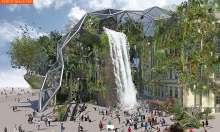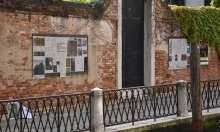Regeneration [and its Discontents]
The way we encounter urban transformations in the modern city vary sharply –– for some, such development marks the emergence of new and 'smarter' future whereas for others a grave omen of a tomorrow they will have no part in. One of the most popular terms for describing these fraught changes is gentrification. While the term has been an effective means for expressing how social inequalities manifest in architecture and the urban landscape, it has a tendency of producing overly reductive narratives about predatory outsiders and local victims. Although these narratives may capture public sympathy -- in their heart warming appeals to the victimised communities -- they have the problematic side-effect of eliminating more nuanced sites of urban agency and positive cultural/political transformation, that are less incorporable in the monolithic accounts of vampiric hipsters vs impoverished grannies.
We thus turn to the concept of urban regeneration and its discontents. Regeneration overcomes some of the setbacks of the gentrification discourse while retaining the myriad social discontents woven within the capitalist urban landscape. The concept bears the ambiguities of urban change as a multifaceted processes, impacted by: architectural interventions, local agencies, cultural-artistic factors, urban growth narratives, as well as investors and zoning policies. Regeneration is not just a methodology for theoretical analysis, but has also been deployed as a method to transform cities. Invoking the urban imagination and providing cultural forces short-term agencies in the conjuring of urban space and social futures.
As the biggest cities in Lithuania go through new cycles of intense change, we need to explore alternative ways to analyse and adjust urban space. Rash urban decision making procedures and profit driven private sector agendas have led to the escalation of tensions between local communities, urban developers, city planners, and private sector investors. These tensions cannot be resolved through isolated architectural solutions.
Regeneration [and its discontents] approaches these fraught conflicts while attempting to move beyond dominating binary oppositions between stagnating local preservation and dystopic global capitalist futures. Specialists of different disciplines will introduce strategies for activating positive urban and architectural development through art, aesthetics and sound. They will also critically analyse the phenomenon of regeneration and its diverse effects. Regeneration [and its discontents] offers a wide but attentive look at urban processes and hopes to cultivate positive strategies for their alternative analysis and practice.
Curators of 27th ARCHITECTURE [discussion] FUND - Tautvydas Urbelis, Miglė Babickaitė ir Noah Brehmer.
Talks will take place at the National Art Gallery (NDG), Konstitucijos pr. 22, Vilnius.
The talks will start at 8.00 p.m. and will be held in English
Additional events will take place at: Luna6 (Zanavykų str. 6), Studium P (Pylimo str. 20), XI20, Empty Brain Resort (Vitebsko str. 23)
Additional events will be held in English and Lithuanian.
The entrance is free of charge.
Strategic partner of the series: Lithuanian Council for Culture
Partner of the series: National Art Gallery (NDG)




